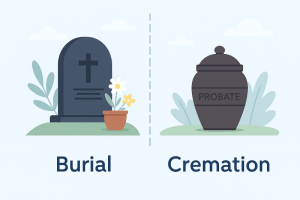Making the right choice for your loved one
When planning a funeral, one of the first decisions is whether your loved one will be buried or cremated. It’s a deeply personal choice, shaped by their wishes, cultural or religious traditions, cost, and location.
This guide explains the differences between burial and cremation in the UK, including costs, considerations, and what might feel right for your family.
🌱 At a glance
- Burial: traditional, often chosen for religious or family reasons; usually more expensive.
- Cremation: now chosen by over 70% of UK families; usually lower cost and offers more flexibility.
- Direct cremation: simplest, lowest-cost option without a service.
- Key factors: cost, religious requirements, environmental impact, and how you’d like to remember your loved one.
🤍 Should I follow their wishes?
If your loved one left instructions — in a will, funeral plan, or even a conversation — those wishes should be followed if possible.
If no preference was expressed, the decision is usually made by the executor or immediate family together.
⚰️ How does burial work in the UK?
Burial remains a traditional choice for many families.
💷 Typical costs
- £4,500–£7,000+ for a full burial (funeral director, burial plot, grave-digging, service)
- Headstone: £800–£2,000 extra
💡 Some councils offer lower-cost options in public cemeteries. You may also consider natural burials in woodland cemeteries, which can be more eco-friendly.
🔥 How does cremation work in the UK?
Cremation is now the most common choice in the UK (chosen by around 70% of families).
💷 Typical costs
- £3,000–£4,500 depending on location and service type
- Direct cremation (no service) starts from £1,000–£1,800
You can hold a service at the crematorium, or separately before/after. Ashes can be kept, scattered, or buried later, giving families flexibility.
🌱 What factors should I consider?
| Factor | Burial | Cremation |
|---|---|---|
| Religious needs | Required in some faiths (Islam, Judaism) | Not permitted in some traditions |
| Environmental impact | Depends on site/management | Often considered greener |
| Memorial options | Permanent grave site to visit | Ashes can be scattered, kept, or buried later |
| Cost | Usually higher (£4,500–£7,000+) | Usually lower (£3,000–£4,500, direct £1,000–£1,800) |
🧭 What if I’m unsure which to choose?
You don’t have to decide alone. A funeral director can explain:
- Local availability and pricing
- What’s included in each option
- How to balance cultural or family traditions with practical needs
💡 Take your time. Unless there are religious requirements, you don’t need to decide immediately.
